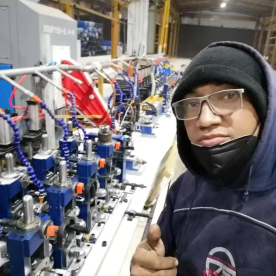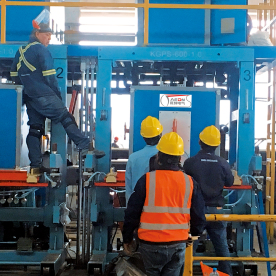[Solid state HF welder for metal processing]Exploring the Advantages and Applications of Solid State HF Welder for Enhanced Metal Processing Techniques
News 2024-8-16
In the realm of industrial metal processing, the advent of advanced welding technologies has transformed traditional practices into highly efficient and precise operations. Among these innovations, the solid state HF (high frequency) welder stands out as a game changer, offering a plethora of benefits for various metal fabrication processes. This article delves into the workings of solid state HF welders, their applications in metal processing, and the numerous advantages they bring to the manufacturing landscape.
Understanding Solid State HF Welding Technology
Solid state HF welding is a modern technique that utilizes high-frequency electrical currents to generate heat. Unlike conventional welding methods that rely on the melting of materials, solid state HF welding joins metals without the need for filler materials. This process is particularly effective in joining materials such as copper, aluminum, and other non-ferrous metals.
The solid state HF welder operates by employing a series of transistors to convert low-frequency electrical energy into high-frequency AC power. This frequency is introduced to the workpieces, causing them to heat rapidly at the interface. The unique physical properties of the materials involved, combined with the high-frequency energy, lead to a solid-state bond that is often stronger than the original material.
Key Advantages of Solid State HF Welding in Metal Processing
1. **Efficiency and Speed:** Solid state HF welding is significantly faster than traditional welding methods. The rapid heating and joining process minimizes production time, leading to increased throughput. This efficiency is particularly beneficial for industries requiring high-volume metal processing.
2. **Reduced Heat Affected Zone (HAZ):** A major challenge with conventional welding methods is the larger heat-affected zone, which can lead to undesirable mechanical properties in the surrounding materials. Solid state HF welding generates heat directly at the weld interface, resulting in a smaller HAZ and preserving the integrity of the surrounding material.
3. **Precision and Control:** The solid state HF welder allows for precise control over the welding parameters. This capability ensures consistent weld quality and reduces the risk of defects. Manufacturers can also optimize the welding parameters for different materials, enhancing overall productivity and final product reliability.
4. **Versatility:** One of the striking features of solid state HF welding is its versatility. This technology can be used for various applications, including automotive, electronics, and aerospace industries. Its ability to join dissimilar metals makes it particularly valuable in industries that utilize a combination of materials.
5. **Minimized Distortion:** Due to the localized heating nature of the solid state process, there is significantly less distortion of the workpieces. This factor is critical for maintaining tight tolerances in precision manufacturing environments.

Exploring the Advantages and Applications of Solid State HF Welder for Enhanced Metal Processing Techniques
Applications of Solid State HF Welding in Metal Processing
Solid state HF welders are used across various sectors, demonstrating their adaptability and effectiveness.

Exploring the Advantages and Applications of Solid State HF Welder for Enhanced Metal Processing Techniques
- **Aerospace Components:** The aerospace sector demands high-quality welds that can withstand extreme conditions. Solid state HF welders provide the necessary precision for components, ensuring structural integrity and reliability without excessive weight.
- **Electronics and Electrical Engineering:** In electronics manufacturing, solid state HF welding can fuse thin metallic layers and connections, ideal for circuit boards and microelectronic devices, where precision and minimal heat application are crucial.

Exploring the Advantages and Applications of Solid State HF Welder for Enhanced Metal Processing Techniques
The solid state HF welder has revolutionized the landscape of metal processing, offering unmatched advantages in efficiency, precision, and versatility. As industries continue to seek innovative solutions to meet rigorous production demands, solid state HF welding is poised to play a vital role in shaping the future of metal fabrication. With ongoing advancements in technology, the potential applications and benefits of solid state HF welders are likely to expand even further, solidifying their position as an indispensable tool in modern manufacturing processes.
